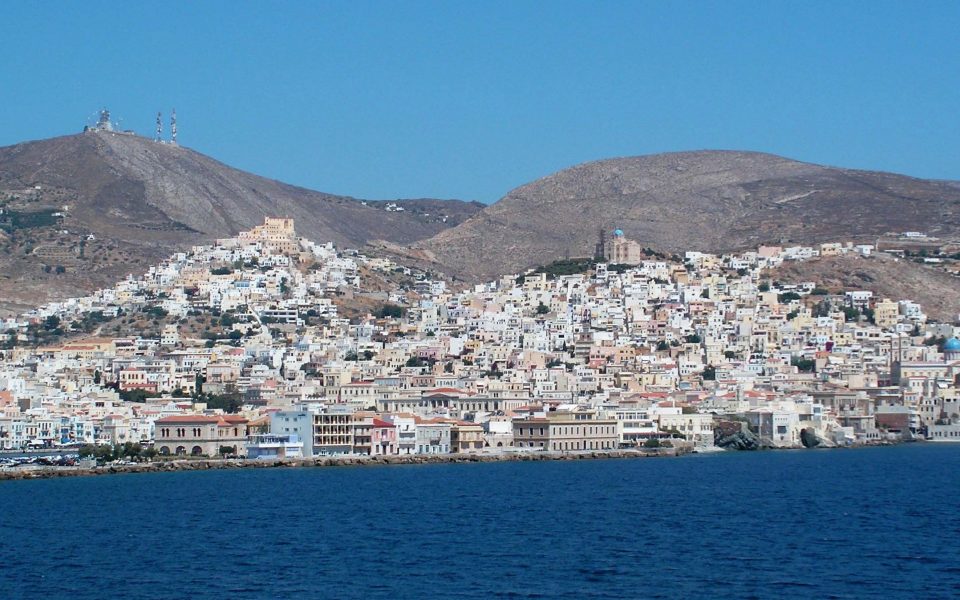Syros is set to become a location for shooting movies

“It’s a miracle we managed to get a law that makes it easier to shoot movies in Greece passed within nine months,” says Pierre Economacos. The Greek American is familiar with the labyrinth that is Greek bureaucracy. Last summer on Myconos, Economacos met with a fellow Greek American who was working with Hollywood director Steven Bernstein to prepare a script for a political thriller. “They were preparing to head to Bulgaria to discuss filming the movie there,” says Economacos. “That’s when I stopped them and convinced them to come to Syros first.”
The invitation was no coincidence. Economacos splits his time between the US and Syros, and is familiar with the stunning landscapes, natural beauty and unique architecture of the Aegean island, where visitors often feel like they’re in a movie setting.
“Four days later, I greeted them at Syros port,” says Economacos, who had already spoken to the island’s mayor, Giorgos Marangos, about setting up a “plan of action” together. “We gave them an in-depth tour of the island,” says Economacos. Bernstein was mystified. “Here is Positano, down there it’s reminiscent of Paris, and over there of Prague,” he said enthusiastically as they were walking around the town of Ermoupoli.
The light of the island made a great impression on Bernstein, who appeared quite inspired by the location. At that moment, the award-winning director had an idea: to start a film school on Syros, which he himself would teach at along with his team. He also expressed a desire to create two permanent studios on the island for TV and movie productions.
Bernstein has experience transforming locations into meccas for filmmaking and production, as he’s done in Toronto and Vancouver. He’s also aware of how expensive it is to film in big cities. For instance, if you want to reserve a street in Paris for filming purposes, that’ll cost you about 80,000 euros.
“Our ambitious plans, however, were brought to an abrupt halt by the lack of a legal framework for such a thing in Greece,” explains Giorgos Leontaritis, deputy governor of the Cyclades region. Leontaritis embraced the initiative and took it upon himself to do what he could to help it along. “After a series of discussions and debates we managed, along with Tourism Minister Elena Kountoura, to table the proposal in November 2016,” says Leontaritis. “We also had the support of Lefteris Kretsos, the general secretary for information and communication.” It should be noted that in most EU countries, 25 percent of the fixed costs of a TV or cinema production is subsidized. In some, like Hungary for example, it is even higher, up to 31 percent.
Of course, there are “paradises” for cinematic production outside the EU, such as Costa Rica and Turkey. “After passing this law, our country is now in line with other EU member-states,” says Economacos. “But we’re still waiting on the introduction of the tax refund and VAT that’s needed in order to be in line with incentives other states already have,” says Leontaritis.
“The benefits of making films in Greece are so obvious they need not even be mentioned,” says Leontaritis, who adds that Syros could be used as a substitute for a multitude of locations. Local communities are still benefiting from the boost they received from the few movies that have been filmed in Greece – such as “Mamma Mia!” “The Big Blue” and “Captain Corelli’s Mandolin.”
“We will aim for the film school to be attended mainly by Greeks, who will then have the training to become international producers, so directors won’t have to bring hundreds of people from abroad,” says Economacos. The investment, according to stakeholders, is around 6-6.5 million dollars. “The added value, however, that it will produce for the country is so much that you can’t put a number on it.”
“The law, which can be improved in future with amendments, has opened a path that can lead to significant investments,” he adds. For now, things are looking up on Syros, and if it continues this way, the first classes at the film school will take place at the end of September.





